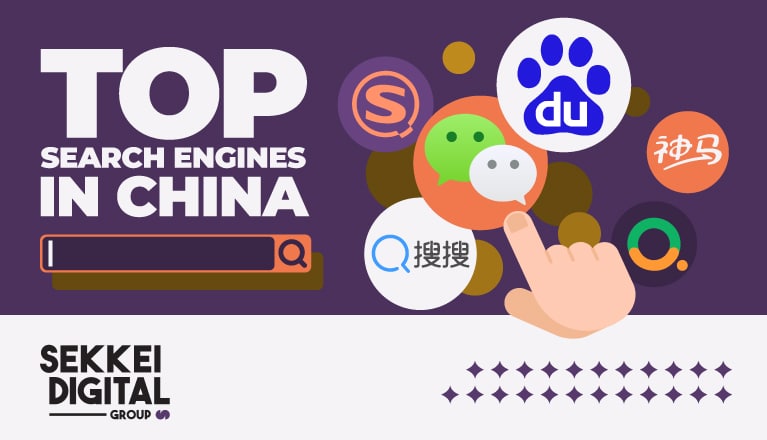Last Updated on May 1, 2024
Baidu is a platform you can’t skip when conducting SEO in China. Not only because it’s the dominant player in the market but also due to the fact that it has a more sophisticated search algorithm and extensive database than other search engines in the market.
With the right SEO strategy, marketers can seize the opportunity to improve their content ranking within Baidu’s search results and generate organic traffic from a highly targeted audience.
To help you achieve this, we’ll walk you through the best Baidu SEO practices and offer expert insights on today’s China search market trends.
What is Baidu used for?
Baidu is a multinational technology company offering Internet-related services and products, but it’s mostly known as a major Chinese search engine. Unlike Google, the platform primarily caters to the Chinese market and prioritizes websites in the local language.
Compared to other search engines in China, Baidu has a larger user base of over 677 monthly active users. Given its expansive reach, conducting search engine optimization efforts for the platform has become the norm, especially for new brands trying to break into the Chinese market.

SDG’s Work With Roche: Baidu SEO Implementations
Beyond search queries for terms, images, videos, and news, users can access other services that can help them improve their content visibility and ranking on Baidu. Here are some of the features you can utilize on the platform:
● Baidu Zhidao
This Q&A forum is famous for its high community engagement, where Baidu users are allowed to either post questions or give answers according to their knowledge and recommendations.
Building a presence using this service allows foreign brands to increase visibility in Baidu SERP. On top of that, it also answers important queries about your business or industry, which could prompt a highly targeted audience to visit your brand’s Chinese web pages.

Example of a question posted on Baidu Zhidao for our client Merck
● Baidu Baike
Instead of Wikipedia, the platform offers Baidu Baike, which is a popular information source that Chinese internet users often find unbiased and trustworthy. Compared to its Western alternative, this paid service serves a commercial purpose.
Businesses can post brand-related articles on Baike, creating an opportunity to execute Baidu search engine optimization strategies. Not only can the content appear on top of Baidu SERPs, but it can also build a positive reputation around your brand.
And while this service allows companies to post content, remember that the articles will still undergo rigorous verification processes.

● Baidu Tieba
With over 300 million monthly users, this forum service accounts for more than 10% of overall traffic on Baidu. It has an uncanny similarity with Reddit, where people can discuss and follow specific topics.
The platform thrives in user-generated content, allowing brands to engage with their targeted Chinese audience. Marketers can also create a bar for their brand and include details like social media accounts and websites. Doing this can also help your content appear on search engine results when users search for terms related to your business.

Example of an article posted on Baidu Tieba for our client Merck
How does Baidu SEO work in China?
Much like Google SEO, the primary goal of Baidu SEO in China is to deliver the most relevant and high-quality content to its target audience. To achieve this, brands must consider various on-site and off-site factors such as keyword relevance, content quality, website structure, and backlink profile.
The only problem is that Baidu SEO is bound to unique nuances and user behaviors that significantly differ from the Google search console. Like other Chinese search engines, Baidu’s ranking factors do not favor non-Chinese websites or content that doesn’t resonate with the local market.
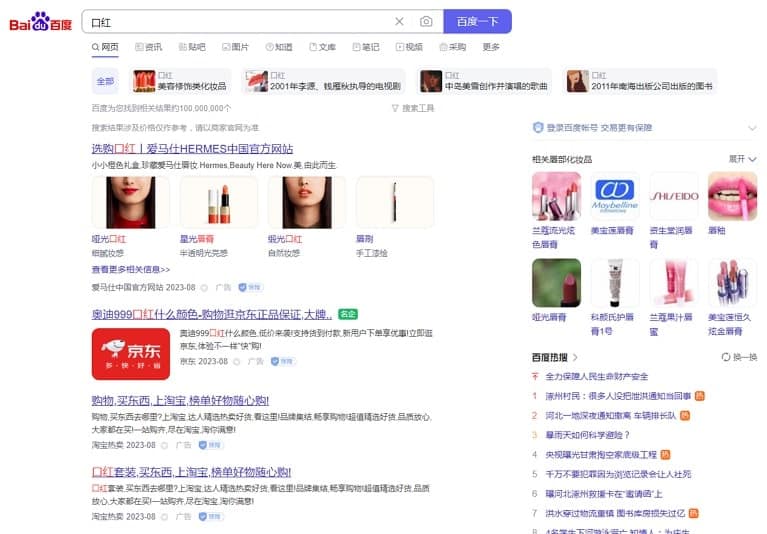
Keeping these things in mind, it’s crucial for a brand aiming to enter the Chinese market to tailor its SEO strategy to meet Baidu’s specific requirements.
Understanding the cultural, linguistic, and technical aspects of Baidu SEO is not just about translating content but about adapting to the local digital ecosystem, complying with local regulations set by the Chinese government, and resonating with the needs of local consumers.
10 Best Baidu SEO Practices Foreign Brands Should Know
1. Localize Website With Simplified Chinese Characters
As we already mentioned in the article, the Baidu index does not give priority to non-Chinese language sites as the local search engine is programmed to interpret Chinese text.
When localizing a website, brands should note that Baidu is predominantly available in simplified Chinese. Although the platform does support traditional Chinese characters, it often converts queries to simplified ones.
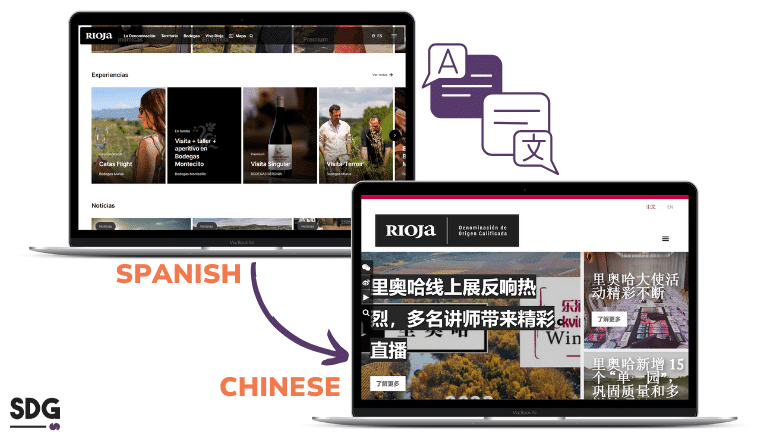
Example of the global website of our client Rioja Wine and its Chinese version
Inaccurate translations can certainly affect your site’s ranking on Baidu. So, if you want better results, you can consider working with a Chinese company with industry experience in translation and content creation. These experts will be familiar with the search terms that are the most appropriate translations of the brand’s original content.
2. Get a Chinese Website Domain Name
If you want to rank high in Baidu’s search engine results, foreign brands must ensure that their Chinese websites do not mix with their English web pages. The best way to resolve this dilemma is to host your website in Mainland China and get an Internet Content Publishing license.
If you intend to use a website for commercial or sales purposes within the Chinese digital landscape, getting a business-level ICP license is legally required. The easiest way to go about this process is to work with a Baidu SEO agency or partner with a Chinese company to represent the business locally on your behalf.
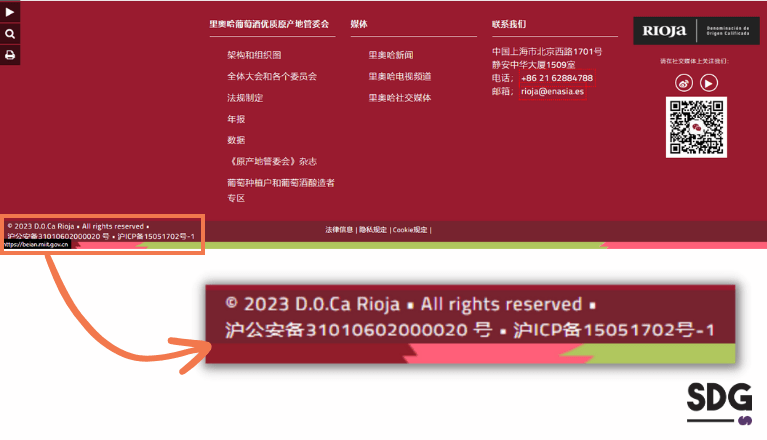
Example of our client Rioja Wine’s Chinese website with Chinese domain name, Chinese hosting and ICP number
If neither of those things is possible, then it’s still possible to register a .cn domain and get hosting in Hong Kong or Korea for fast speeds, but this allows for less scope when it comes to the business operations said website may perform.
Nevertheless, getting a .cn domain improves your website’s topping Baidu ranking, making it a valuable step for any SEO strategy.
3. Conduct Keyword Research & Define Meta Descriptions/Tags
A massive part of Baidu search engine optimization is adding relevant keywords to your content to reach the right audience.
Marketers must conduct thorough keyword research based on popular terms on Baidu SERP. They also should conduct a market study to see how their industry competitors rank on Baidu and their strategies to achieve better results.
Unlike Google, Baidu SEO favors precise keywords, so your priority should be adding relevant title tags and image descriptions for your content. You can also utilize built-in back-end tools from the platform, like Baidu Index and Baidu Keyword Planner.
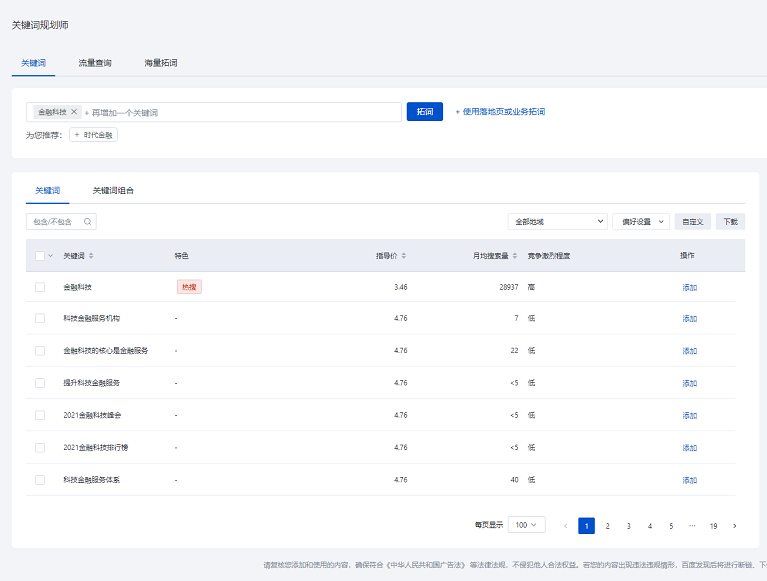
Example of Baidu Keywords Planner, with prices, monthly search volumes and competitiveness
While Google SEO now focuses on content quality and relevance, the Baidu search engine still highly values metadata. So, you must take extra caution and research when adding Meta Description, Meta Keywords Tag, Title Tags, H1/H2 Tags, and Alt Tags.
Baidu’s servers are actively crawling these elements, so we highly suggest you keep them written in simplified Chinese. It should also improve your website’s ranking on Baidu search results.
4. Create & Post Relevant Content for Chinese Users
A guide to Baidu SEO wouldn’t be complete without us emphasizing the importance of relevant content. No matter how many keywords you integrate into your content, the reality is this Chinese search engine prioritizes original and high-quality posts.
Like Western search engines, trends within the local digital landscape come and go fast. Because of this, marketers must always be on guard for the latest updates and topics within their industry.
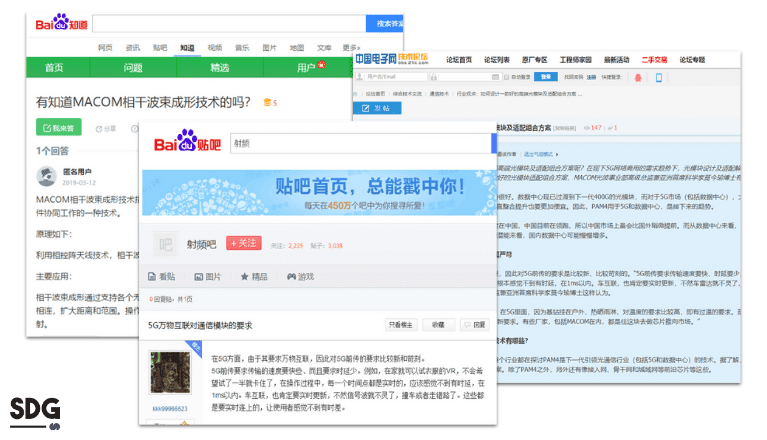
SDG’s work with Macom: SEO Link Building & Content Marketing
The post frequency of your website also determines the ranking on Baidu. An active site is likelier to get better positioning in local search results than inconsistently updated ones. However, you should be wary of duplicate content since it could decrease the content ratings.
Besides publishing frequency and content quality, not abiding by censorship regulations can also affect your Baidu rankings. Including anti-government speech or exaggerated product terms will not only remove the content from organic search results but can also lead to being blacklisted.
If you want to avoid such consequences at all costs, you can entrust your Baidu SEO strategy to professional digital agencies in China.
5. Build Quality Internal & External Links
Another trick not all marketers know about Baidu SEO is that the platform often puts websites with many relevant backlinks on top of organic search results. Links from and to high-authority Chinese websites are always best.
Typically, the content Baidu prioritizes in its search engine results page includes backlinks from official sources like newspapers or Chinese government websites.
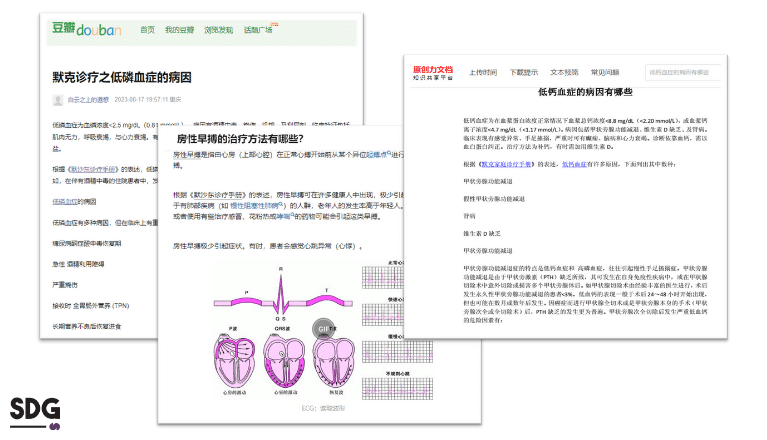
Examples of Backlinks articles for our client Merck
When it comes to this Baidu SEO strategy, you should also remember that quantity matters. While inbound links from authoritative sites are excellent ranking factors, getting backlinks from less reputable websites carries as much importance.
On top of that, don’t forget to anchor internal links that can lead your audience to another related web page within the website. Having this structure helps Baidu spider to web your content together and increases your odds of climbing the rankings.
6. Use HTTPS instead of HTTP
Algorithms for Baidu SEO highly value the HTTPS protocol mainly because of its security. It requires you to purchase an SSL certificate from within China. After it’s purchased and applied, submit a new sitemap.xml to the Baidu search console. A good marketing agency can help smooth this sometimes-puzzling process out.
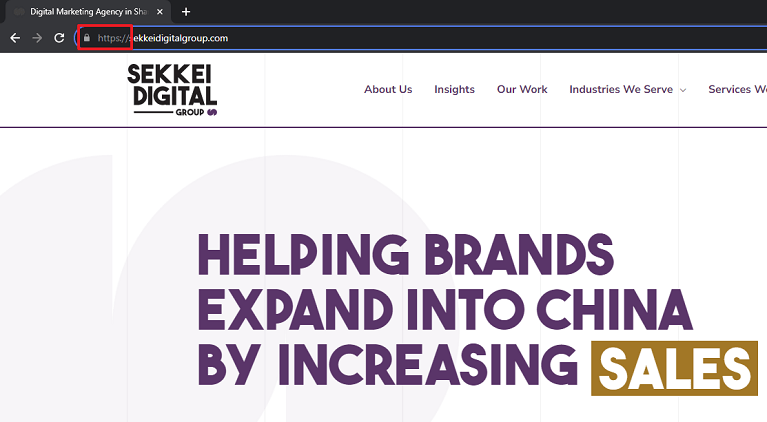
Using HTTPS, data is transmitted securely through SSL, a factor highly regarded by search engines. While SSL prioritizes the safety of data transfer, HTTPS focuses on the integrity of the data’s presentation.
This dual benefit makes HTTPS an ideal choice for websites. It enhances the user experience while maintaining protection during data transmissions across various interactions. Together, HTTPS and SSL collaborate to establish a secure online environment.
7. Prioritize Mobile Optimization During Website Development
China is a “Mobile First” country, with over one billion users accessing the digital landscape through their phones. Around 78% of this user base utilizes mobile search daily for different queries and purposes.
Given its high penetration rate among Chinese internet users, mobile optimization has become a ranking factor in Baidu. Mobile-friendly websites will be ranked much higher on desktop and mobile searches.

Baidu will likely transcode your website if you do not optimize for mobile. It means taking the data onto their servers and automatically making it ‘mobile search friendly’. Suffice it to say, their automatic conversion might align with a different definition of ‘mobile-friendly’ from that which you follow.
In Google SERPs, searches for mobile and desktop are combined within the same URL. Meanwhile, the Baidu search engine transcribes mobile queries through m.baidu.com.
Although Baidu has automatic conversions for non-mobile-friendly websites, you must remember that this process can cause interruptions in user experiences and interfaces.
8. Conduct Backend Maintenance
Submitting sitemaps is vital because it’s the only way search engines can index your website. If you skip this step, you’ll have difficulty ranking on Baidu SERPs. You can proceed with site submissions in their open-source platform.
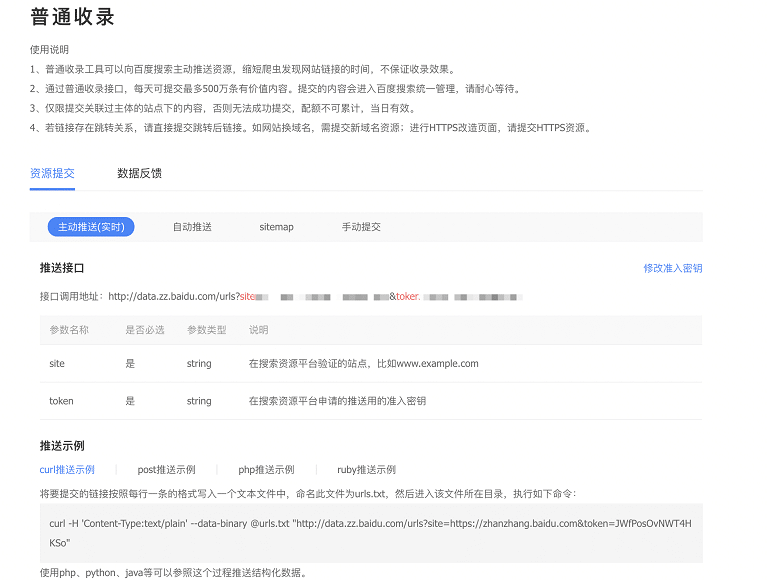
Example of sitemap submission in Baidu
Ensure the sitemap you generate has a “.xml” extension before submitting it. Also, keep an eye on robots.txt to make sure that Baidu crawls through every section you want it to. Verify your website by adding a verified file on the root directory of your server.
9. Avoid JavaScript, iframes or Flash content
Unlike other search engine options from the West, Baidu’s algorithm does not recognize any interactive JavaScript apps or flash content.
Flash is out of the window now anyway, but keeping an eye on using JavaScript is a necessary task. If it’s used to facilitate a part of the website that doesn’t serve an SEO purpose, then it’s not a huge problem. But wherever SEO is directed, JavaScript must take leave.
For the most part, sticking to straightforward HTML is your best bet if you want to improve your search engine positioning.

10. Utilize Baidu Webmaster Tools
Your Baidu SEO strategy should not end after the content has been posted. If you want to continue ranking high in this search engine, you can monitor analytics and performance using Baidu Webmaster Tools and Baidu Tongji.
The latter is like Google Analytics, allowing you to analyze the standard flow of traffic and usage data, sources, and conversions. With some customization, data points for visitor analysis can include geographic location, device, educational level, age, vocation and interests.
Baidu Tongji provides visual representations like site heatmaps to understand better and represent user behaviour.
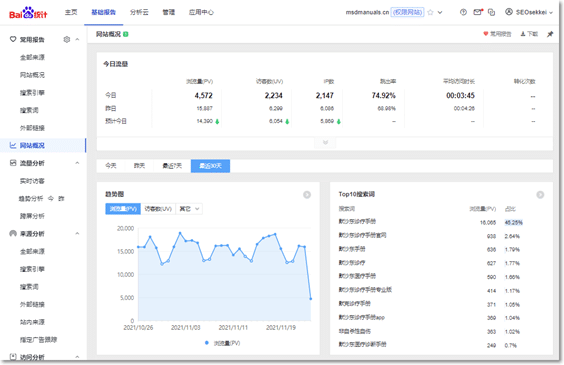
Example of Baidu Analytics account for our client Merck, with all data for traffic, top keywords, top landing pages, etc.
Meanwhile, Baidu Webmaster tools take it a step further by providing reports on your website’s organic position and performance metrics to help you identify issues that may affect content ranking.
On top of that, Baidu Webmaster Tools also includes features that are handy for site testing. These elements make search engine optimization easier for website owners and serve as a two-way communication between you and the platform.
China Search Market Trends in 2023
Specialized Search Platforms
E-commerce, social media, and video streaming platforms are gaining immense popularity in the Chinese market, so it’s not a surprise a handful of local users prefer specialized search engines within these apps.
If you think about it, popular platforms are already innovating and developing their built-in search functions to serve their audience better. Some of the best examples are WeChat Search, Pinduoduo, and Douyin.
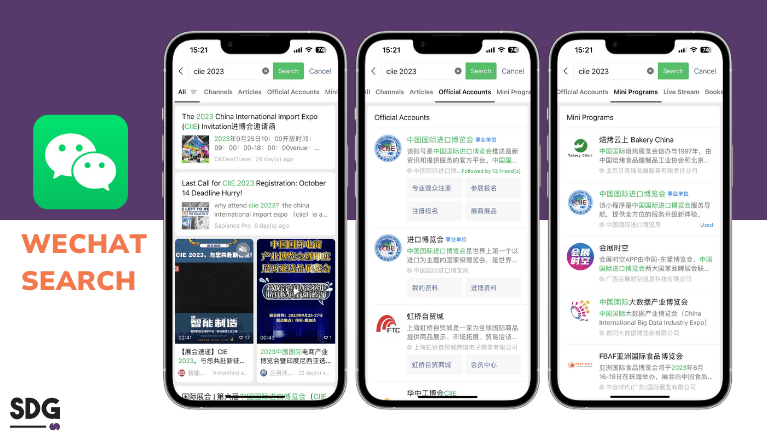
Search Personalization & AI
The rapid development of AI and machine learning allows algorithms in Chinese search engines to deliver more personalized search results tailored to individual user preferences and behaviors.
With voice search capabilities and predictive typing, searches are now more intuitive than ever. Marketers should take note of this development, especially when creating Baidu SEO strategies.
Top Baidu SEO Mistakes You Should Avoid
Just as there are many ways to improve your Baidu SEO strategy, you should also be wary of common mistakes that could jeopardise your optimisation efforts. Here are some reminders foreign brands you must remember to avoid any repercussions from the platform:
● Adding Links from Banned Sites
As part of the local digital ecosystem, the Chinese search market also imposes strict censorship on Western social media websites like Facebook, Instagram, and Twitter. So, if you ask us, it’s best not to include these links on your website’s social widgets.
We suggest sticking to top Chinese social media platforms like WeChat, Weibo, Douyin, or Kuaishou.
● Scale Your Geo-Targeting Down
Always remember that your Baidu SEO strategy can be adjusted based on your brand’s target audience. While it’s not uncommon for marketers to focus on consumers in first-tier cities, you should know that these targeting options are saturated.
If you want a broader reach, shifting your geo-targeting techniques to second and third-tier cities is not a bad idea. These places comprise millions of internet users untapped by most foreign brands.
● Setting Bad Title Keyword Tags
As previously stated, these tags are a huge part of how Baidu ranks your content. It embodies what your web page is about, so tagging incorrect keywords for your posts can significantly affect your website’s ranking.
Page titles also attract your target audience to click on the website’s content. If you’re unsure what keywords to explore for your posts and landing pages, you can try observing your competitors or working with a Chinese digital marketing agency to streamline your content creation needs.
Your Baidu SEO Partner in the Chinese Market!
Being well-versed in the best Baidu SEO practices gives foreign brands an advantage over their competitors in terms of visibility, engagement, and success within the Chinese market. However, marketers should note that it’s a long-term strategy that relies on the changing technicalities and regulations of local search engines.
You may also want to read:
Don’t let the complexities of the search engine market hold you back! Our experienced team is here to guide you through every twist and turn, unlocking your brand’s full potential and ensuring resounding success in Baidu’s dynamic landscape.
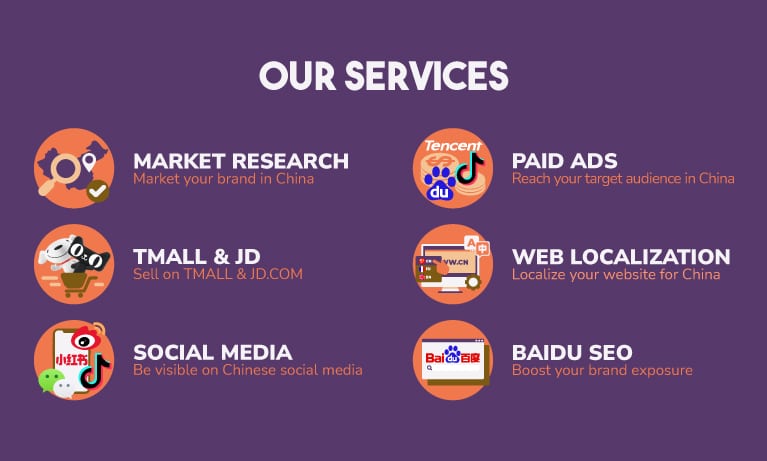
We offer comprehensive services to empower your SEO & SEM strategies in China. From crafting compelling marketing campaigns to harnessing the power of SEO and social media, we provide the digital solutions you need to thrive. Contact us today to learn more!
References:
Baidu SEO – Your Baidu Search Engine Optimization Guide
How to Do Baidu SEO (Baidu Search Engine Optimization) Ultimate Guide 2023


